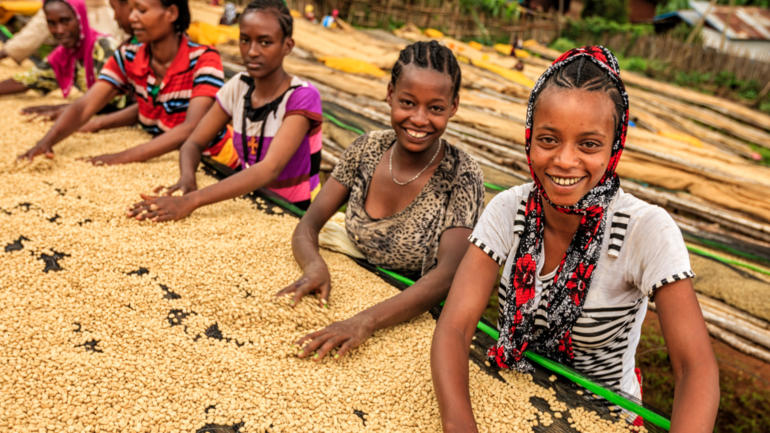In WBCSD’s Vision 2050 and strategy for 2022 to 2027, tackling the climate emergency, halting nature loss, and reversing the rise in inequality are identified as the critical imperatives of our time to ensure 9+ billion people can live well within planetary boundaries by 2050. Food systems uniquely intersect these three imperatives, and we must accelerate the global transformation towards an equitable, net-zero and nature-positive food system that can nourish all people. Businesses are working together and with other stakeholders to take a leading role in this transformation and industry must continue to be part of the solution towards lasting, systemic change.
It will not be possible to make meaningful progress on these imperatives while billions of people are hungry or malnourished. The ability to access and afford a healthy and sustainable diet is a core dimension of global equality – people who are nourished are more likely to survive and thrive. However, hunger and malnutrition remain far too prevalent. In 2020, nearly a tenth of the world’s population was hungry, amounting to as many as 811 million people. Nearly one in three people in the world (2.37 billion) did not have access to adequate food in 2020, an increase of almost 320 million people in just one year. If we continue producing and consuming food the way we do today, it is estimated that 40 million children will suffer from obesity or overweight in the next decade and by 2025, 2.7 billion adults will be overweight, with over 1 billion affected by obesity and 177 million adults severely affected by obesity. This is not the future we want to create.
During the Tokyo 2021 Nutrition for Growth Summit (N4G) diverse stakeholders came together to make progress toward ending malnutrition in all its forms by 2030. In the two years leading up to the Summit, WBCSD served on the N4G Advisory Group and co-chaired the N4G Business Constituency Group (BCG) to support private sector leadership at the Summit. WBCSD, together with the N4G BCG, developed the Responsible Business Pledge for Better Nutrition (RBP), a framework to guide business action and the development SMART commitments for the N4G Summit. Fully aligned with the N4G Commitment-making Guide and Principles of Engagement, it calls on business leaders to make nutrition a board-level priority and on each corporate signatory to bring forward at least three SMART commitments to N4G.
Since then, WBCSD members have worked together to bring a collective voice and true corporate leadership to driving improvements in nutrition globally. In particular, members of WBCSD’s Food Reform for Sustainability and Health (FReSH) project developed six collective commitments aligned with the RBP that are driving action within individual companies and across the sector:
Many FReSH members have submitted SMART commitments to the Nutrition Accountability Framework adapted to the material issues their company can tackle linked to the collective commitments above. FReSH members are committed to helping solve malnutrition and to step up as leaders in driving progress on nutrition improvements around the world.
WBCSD is thrilled to celebrate the 35 nutrition commitments our members have made this year, some of which are linked to the N4G Summit and others are tied to the UN Food Systems Summit, which took place in September 2021. All of these commitments are aligned with WBCSD’s new strategy, and with the transparency and accountability measures embedded in the commitment-making process, we believe they represent significant business leadership and progress on this critical issue. Here are some of the commitments from our members that have been registered in the Nutrition Accountability Framework:
- By 2030, Cargill will have invested $50M in initiatives that enhance food systems within vulnerable communities across the regions in which it operates by supporting both local producers, including smallholder farmers, and local food providers, such as school feeding programs and small businesses, and facilitating and strengthening market linkages between them.
- By 2030, Cargill will leverage its expertise in animal protein production to improve the nutrition and economic livelihoods of 100 million people through the Hatching Hope Global Initiative, which supports small- and medium-scale poultry production, strengthens local poultry markets, and increases local poultry consumption, in collaboration with partners including co-founder Heifer International.
- As food manufacturers seek ways to help improve consumer diets, Cargill is supporting its customers by committing to remove iTFAs from its entire global edible oils portfolio. This helps both Cargill and its customers comply with the World Health Organization’s (WHO) recommended standard of a maximum two grams of industrially produced trans-fatty acids (iTFA) per 100 grams fats/oils by the end of 2023. Cargill is the first edible oils supplier to make this commitment, joining many of the world’s largest food companies and members of the International Food and Beverage Alliance (IFBA) who have committed to the WHO goal.
Compass Group
- Develop and launch a Food Waste reduction toolkit and training program: 1000 locations by 2025
- Develop & conduct plant forward training: 500 chefs/culinary associates trained by 2025
- Build a Teaching Kitchen toolkit that educates guests on how to prepare healthy & sustainable meals: Teaching Kitchen classes delivered to 250 locations (including virtual) between 2022-2025
- Healthy meal options developed and offered at client locations: Number of sites globally offering at least 1 healthy meal choice 90% by 2025
- Offer clients sustainability dashboard tracking on key metrics: 25 client presentations per year through 2030.
Danone
- Reach at least 85% (volume weighted) of the company product portfolio intended for the general population (above 3 y.o.) being rated A or B by NutriScore by 2025.
- Reach 100% (volume weighted) of company product portfolio intended for children (3-12 y.o.) being rated A or B by NutriScore by 2025
- Reach 100% of Danone products intended for the general population (above 3 y.o.) providing simple and science-based interpretative nutrition information either on-packs and/or on digital tools by 2025
- Enabling to close the micronutrient gap of 800 million vulnerable people by 2030: DSM will step up their improved nutrition programs with fortified food and public health supplements, and step up their cooperation with civil society, including WFP, UNICEF, World Vision amongst others. They aim to reach the most vulnerable people (notably mothers and children), nutritious school meals and employer workforce nutrition. Based on their human nutrition and food application science they bring a differentiated portfolio of fortified staples including fortified rice matching the local habits and preferences.
- Supporting the livelihoods of 500,000 small holder farmers by 2030: DSM aim to quadruple their supplier engagements expanding from their Joint Venture in Rwanda with Africa Improved Foods into more Sub-Saharan countries. To this end, they will work with governments, farmer cooperatives, feed millers and egg producers, applying new blended finance models (governments, private sector, donors, civil society).
- Good workforce nutrition for all employees: As a company focused on supporting good health through nutrition, DSM ensures access to good nutritional information and healthy nutrition for all employees, following the guidance of the Workforce Nutrition Alliance. This starts with good nutrition education and healthy food in the workplace. By 2025 DSM aims to provide for 80% of their workforce with access to healthy food in the workplace.
- Workforce Nutrition Alliance: Google have become a proud signatory member of the Workforce Nutrition Alliance. By taking the Alliance’s self-assessment, Google have a baseline and uncovered opportunities to strengthen the nutrition components of their food at work program.
- Culinary Training and Education: Google are working with their global partners including the Culinary Institute of America to implement a plant-forward curriculum that will help train and empower chefs at Google and beyond to excel at preparing flavorful, nutritious, balanced plant-forward dishes.
- Agrobiodiverse Ingredients: Google are increasing the proportion of agro-biodiverse legumes and grains used in their recipes and menus.
- Food Literacy: Google are promoting diverse foods and balanced diets with ongoing education through cooking classes, chef talks, Farm to Table programs, and more. They aim to provide increased visibility to the healthier options on their menus around the world as well.
Griffith Foods
- At least 50% of their finished products will meet or exceed external global nutrition standards by 2030
- External global nutrition standards will be incorporated into their product development process for all innovation projects by 2025
- 100% of their global workforce will successfully complete a nutrition education program developed by credentialed healthcare professionals by 2025
- Griffith Foods commits to partnering with their customers to develop and offer more nutritious products, including more plant-forward offerings, by 2030
- 25% of their portfolio will use regenerative agriculture ingredients by 2030
- Griffith Foods will increase their investment in nutrition (e.g., through investments in nutrition-forward startups, creation of a nutrition center of excellence, etc.) by 2030
IKEA Food commits to increasing the share of healthier and plant-based options in their offer, to enable healthier and more sustainable lives for the many people. By 2025:
- 80% of all main meals offered in the restaurants shall fulfil the IKEA Food Nutrition Profiling System for healthier food
- 50% of main meals offered in our restaurants shall be plant-based and 80% shall be non-red meat
- 80% of all packaged food offered shall be plant-based
Olam
- By 2030, 100% of Olam’s total workforce will have access to nutrition programmes.
- By 2030, Olam will reduce post-harvest loss by 50% in own operations and Olam-managed farmer programmes, in line with the Champions 12.3 coalition target
- By 2030, Olam will produce 1 trillion servings of micronutrient fortified foods
Unilever
- 1 billion Euro annual sales from plant-based meat and dairy alternatives by 2025-2027
- Double the number of products delivering Positive Nutrition by 2025. (Positive nutrition is defined as products containing impactful amounts of vegetables, fruits, proteins, or micronutrients like vitamins, zinc, iron and iodine.)
- 70% of our portfolio to meet WHO-aligned nutritional standards by 2022. (Thereby continuing to lower salt, sugar, and calories in products)
- Unilever’s biggest food brand Knorr will get food that is good for people and planet on 7 bn plates by 2025 (Food that is good for people and the planet is defined as impactful amounts of positive nutrition or Future 50 Foods)
- Assess the Workforce Nutrition Alliance 4 pillars score card in 70 manufacturing sites, with on-site catering, and define action plans by 2026
Following these ambitious businesses commitments on nutrition, we expect many more companies will step up efforts to tackle malnutrition and improve global food systems. We urge all of our members – and the broader food and agriculture industry – to make similar commitments over the coming year with the aim of significantly improving nutrition globally by 2030. WBCSD will continue to support private sector leadership on nutrition and the broader food system transformation agenda for the planet and for people, acknowledging the complex linkages between nutrition, healthy diets, agricultural practices, land use, climate change, biodiversity, and equitable livelihoods.
Commitment-making, collective action, appropriate accountability measures and transparency, and partnership across sectors are key levers to overcoming some of the most insurmountable problems our planet and fellow humans face. Companies are at the table and will continue to bring forward innovative, sustainable, and inclusive solutions to deliver healthy, safe, and nutritious food for all.
About WBCSD’s Food Reform for Sustainability and Health (FReSH) project:
The FReSH project develops solutions to drive food system transformation in order to support healthy people on a healthy planet. We take a “fork to farm” approach, starting with the dietary shifts that are required for everybody to eat well, within environmental limits. We develop, implement and scale transformative business solutions aligned with science-based targets.








